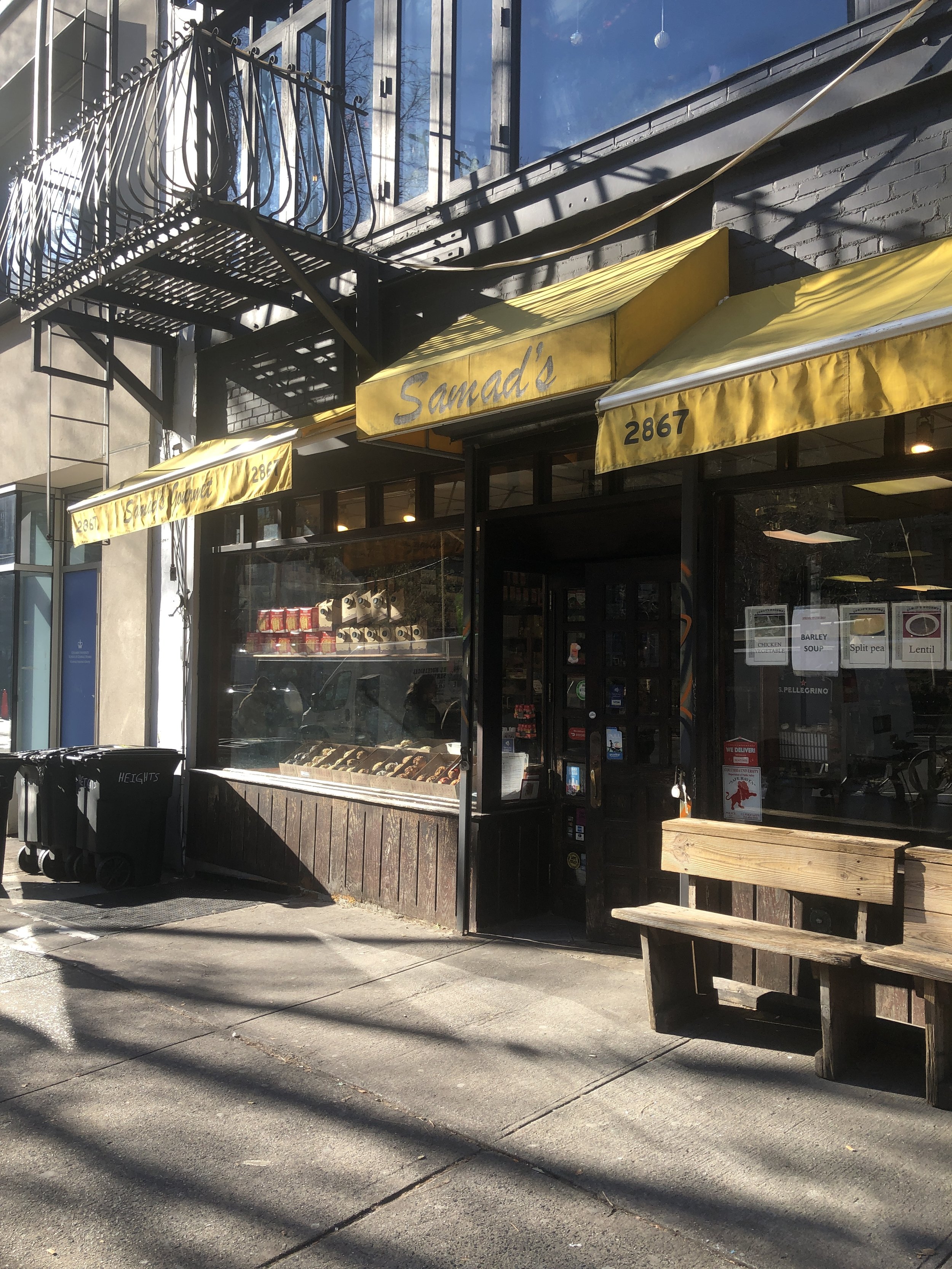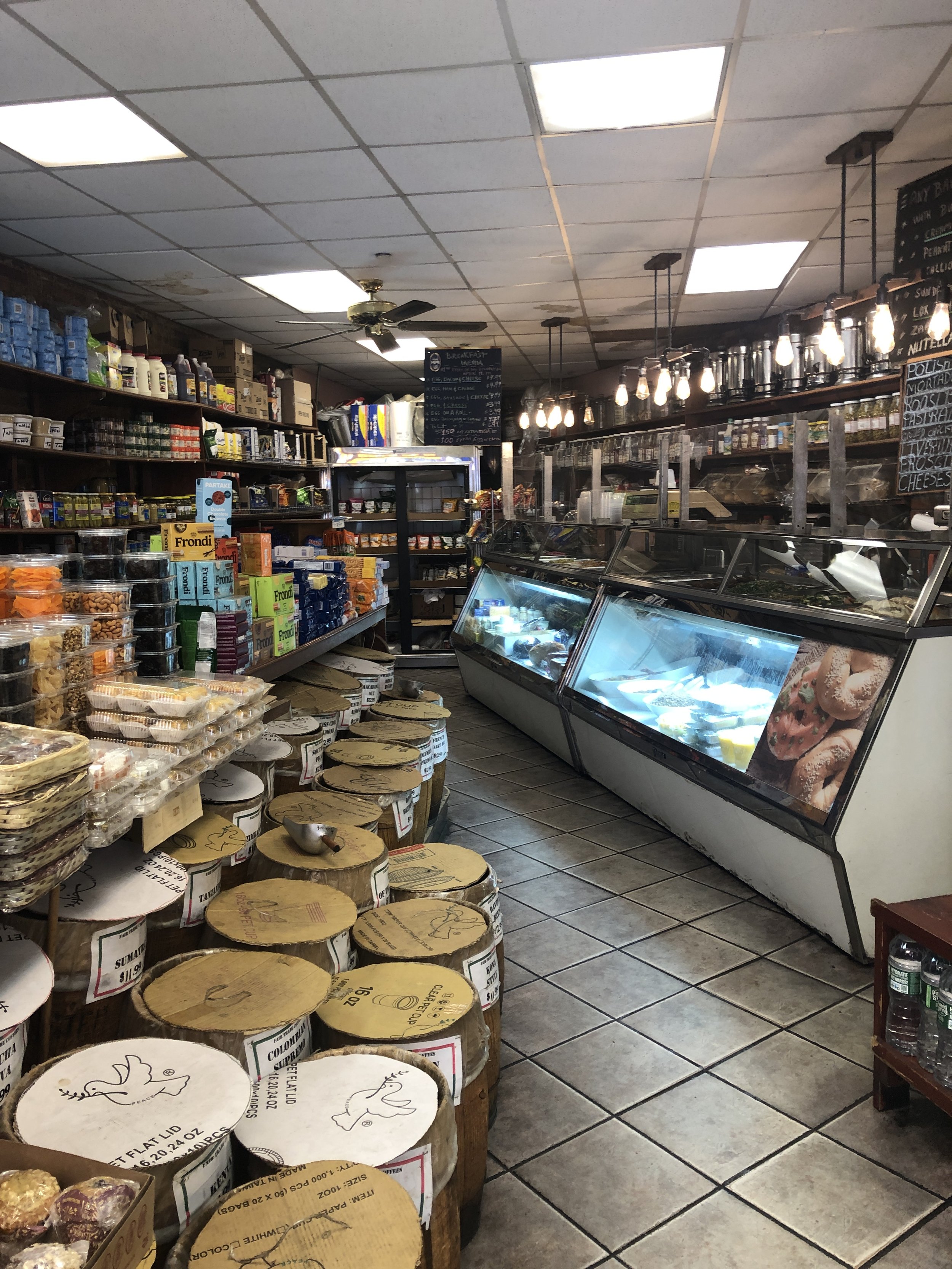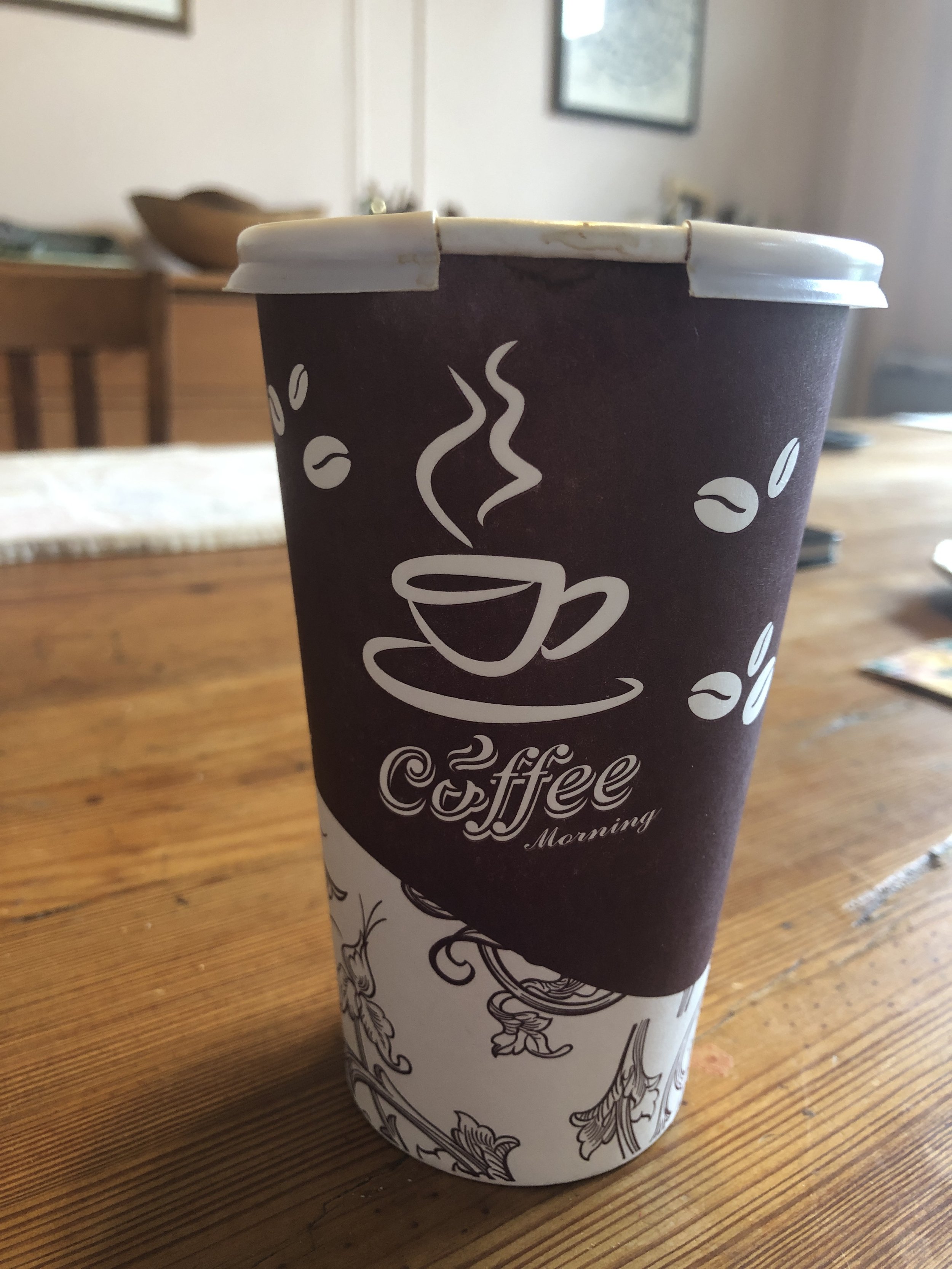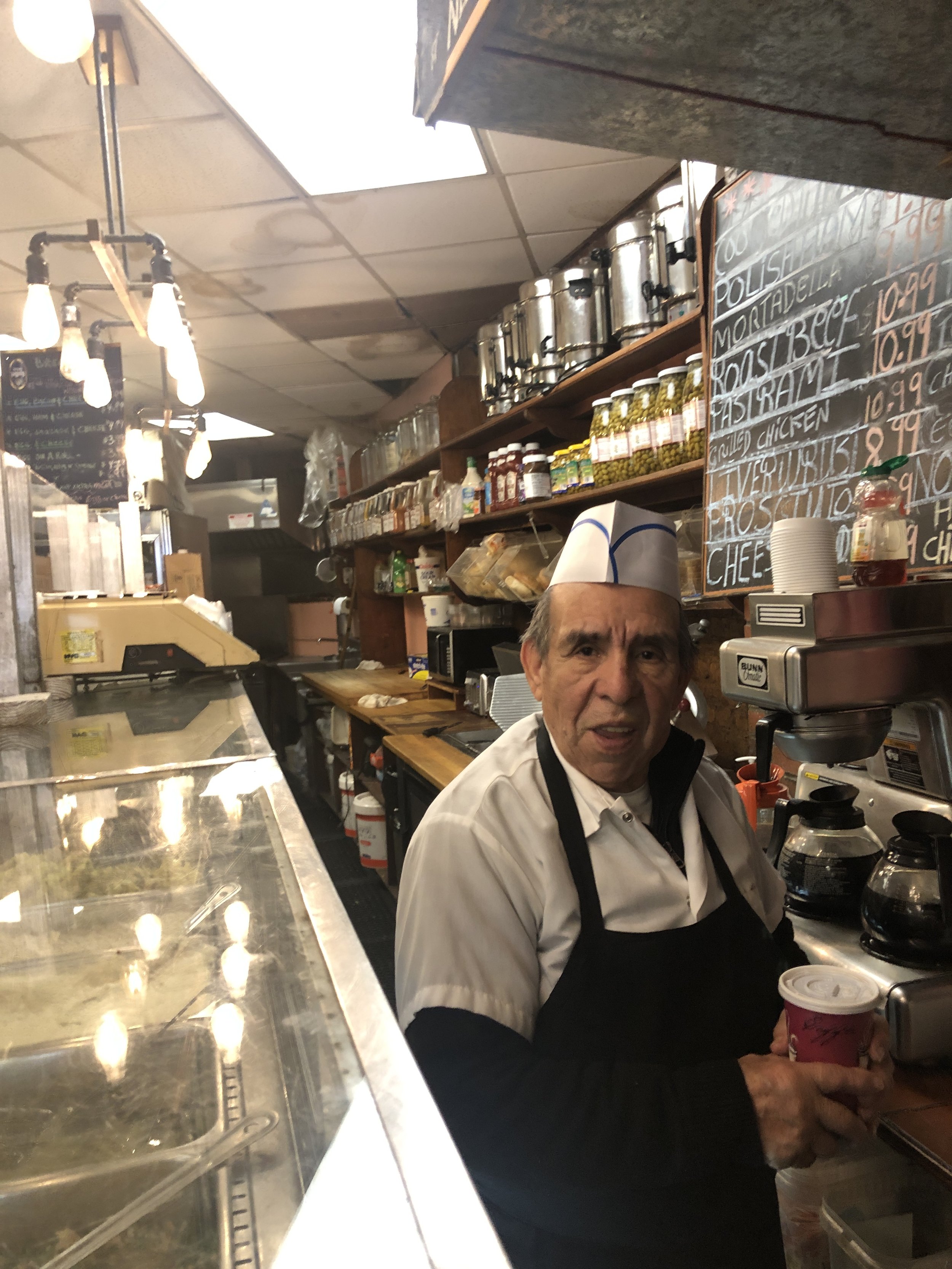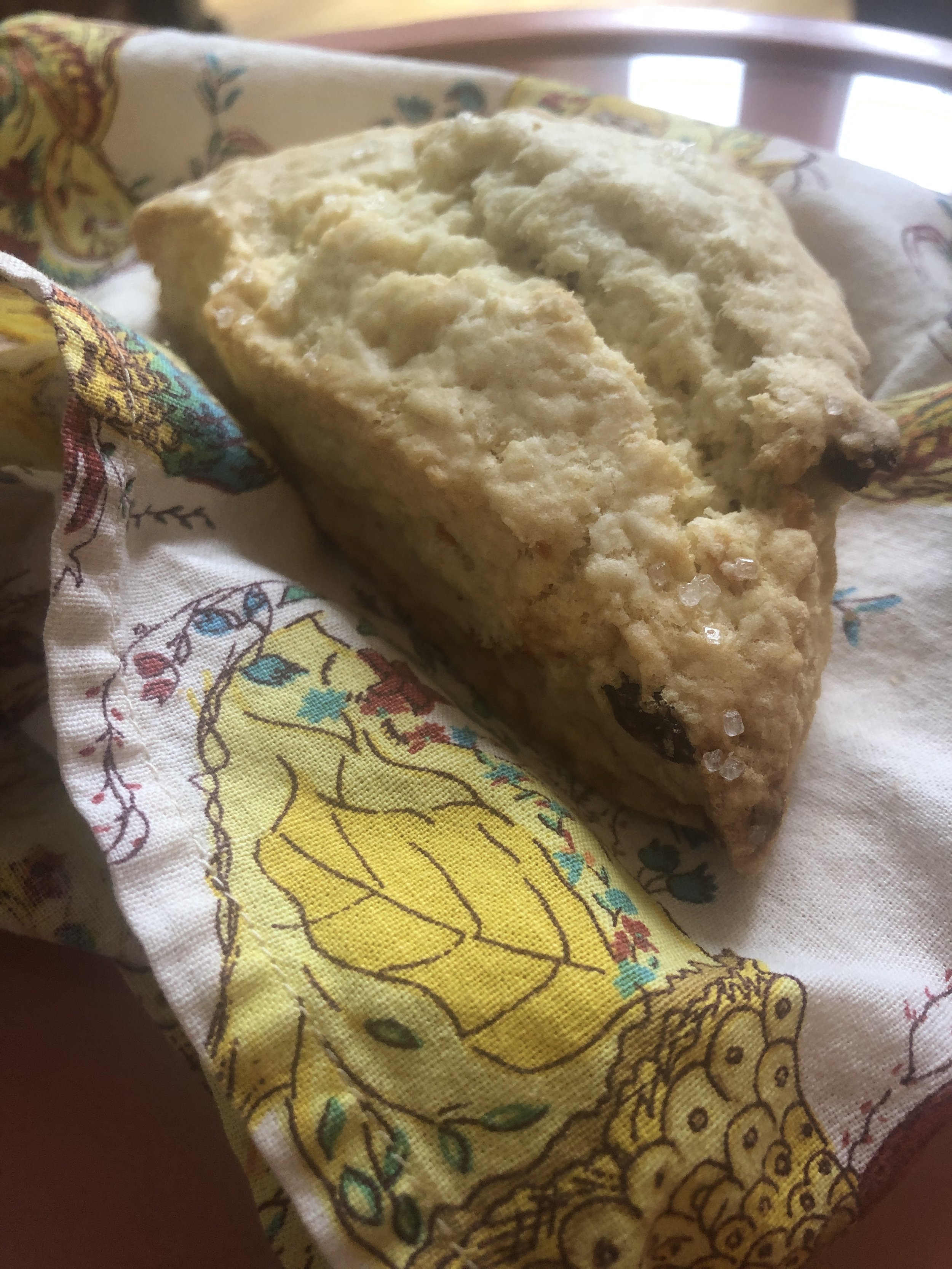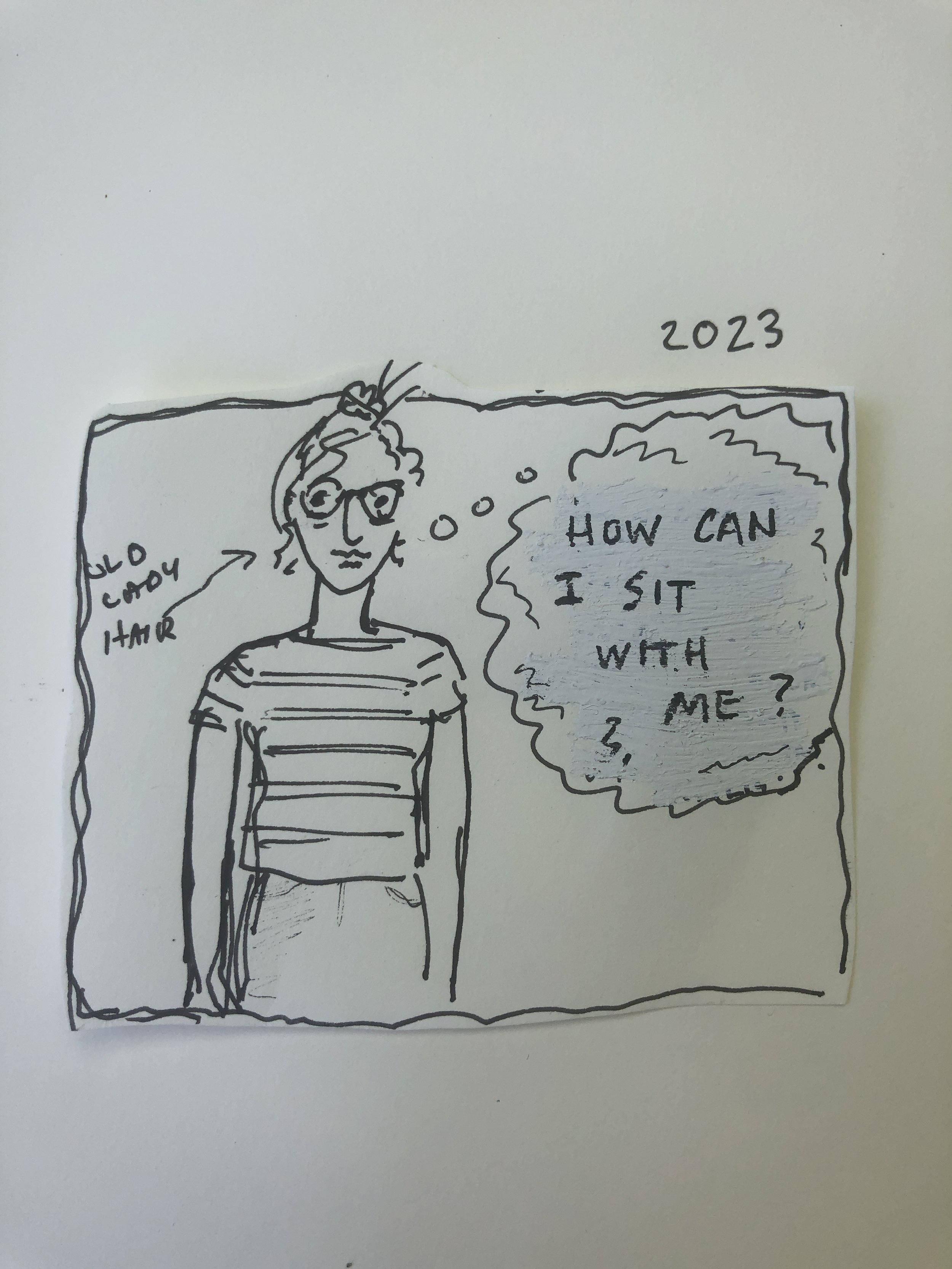Morningside Mornings at Samad's Gourmet Grocery
Samad’s Gourmet Grocery is an anchor of my Morningside Heights neighborhood and a mainstay of my morning routine. Started by Youssef Samad in 1971, the Lebanese inflected grocery store and deli serves the usual array of cold cuts alongside Mideastern specialties—from trays of chickpea and eggplant salads and stuffed grape leaves to date cookies and honey cakes by the register. As chains with “bowl” in their names have taken over our stretch of Broadway, Samad’s has steadfastly retained its foothold on the avenue, and an irregular foothold with a history, at that. You walk into a triangular pie slice of space—at the crust, say—with the walls of the store converging in a 26° angle at the back. That’s because Samad’s doesn’t hew to the Manhattan street grid put in place in 1811. Instead the north wall follows a lane that separated the farms of Nicholas De Payster and James De Payster in the 1700s.
I imagine the residents of the DePayster farms hanging their arms over the fence, talking in the bright winter sunlight just like my Broadway neighbors come to bask in the sun at the small bench at Samad’s, to nurse their coffee (more on which soon) and kibbitz. As you know from my Snack Attack on Daily Provisions I see kibbitzing benches as a feature of our gemütlich Upper West Side ethos. We are talky. The men that own and run Samad’s are talky, too. Often when one is at the cash register, a partner will pull up a stool while they chat in lilting Arabic. On the bench outside the neighborhood elders exchange symptoms or Columbia University classics professors debate the merits of a new translation of The Odyssey. Once I eavesdropped on the head of NASA’s atmospheric division, which sits atop Tom’s Restaurant, talk with a colleague about sharks, crocodiles and evolution…essentially why are crocodiles here at all? I sat in winter sunlight with a Crocodilian smile on my face snapping up little bits of the conversation to text to a friend who texted back: This is my dream conversation.
An Honest Cup of Coffee
But writing is solitary work. When I first started coming to Samad’s in 1993 we had just moved back to New York City from Seattle, and I had just set out my shingle as a freelance writer and editor. I needed a ritual to mark the start of my workday, and I found it with a cup of decaf coffee in a paper cup from Samad’s which devotes the center island of the store to barrels of fragrant coffee beans. I know that writing “decaf” there makes me an easy mark for coffee aficionados. For me coffee is not about the caffeine buzz but the warmth, the aroma and the rich flavor that snap the blurry outlines of the just forming day into crisp focus.
About a year after I started getting my daily medium decaf ($2.25) at Samad’s, the two longtime friends from Lebanon, Wassim Malaeb and Hikmat Hassan, along with Samad’s sons Nassar and Feras, took over ownership of the shop. They always greeted me with a friendly nod or word. When I had my children, I inevitably stopped in for sustenance—rugelah or plastic wrapped poppy seed cake—to carry me through the long strolls to get one child or the other to nap. I sat on the worn bench with my new mom friends. In the back, manning the deli counter and coffee machines, Mexican Julio became a fast friend. Recently, he motioned for me to come close and whispered: “You know I love you, don’t you?”
I don’t feel so deserving of that love, though! When my work picked up and I needed a serene, space uncluttered by toys, I moved my “office” to Columbia’s Butler Library and took my coffee in a refillable Blue Java café cup. Then when the library shut its doors during the pandemic I started getting my decaf Americano ($3.75) just down our block at Oren’s along with a light and sugary cinnamon bun or a dense mixed berry scone ($3.75). As soon as Columbia University opened its doors again to faculty family like me, I decamped in relief to the library. Last year marked 30 years since I optimistically hung out my “shingle,” writing and editing everything from alumni magazine articles, genre fiction, nonprofit websites, and, my bread and butter, business school case studies. Since my sister died four years ago followed by the COVID-19 pandemic, I stopped actively pursuing new clients. Now, more than ever I need that coffee in a paper cup to propel me forward from the morning into what can seem frighteningly formless days and years. Working for years on my own, I have never felt my isolation more keenly. Where I once was energized and grounded by the buzz of Columbia students in the Butler lounge where I worked, I now feel shut out, and worse—in contrast to the young 20-year-olds around me—old.
At 65 I want to greet and be greeted daily by people who know me. I am still figuring this out, telling anyone who will listen, “I want to be part of some small purposeful human endeavor.” In the meantime, I know the importance of what sociologists call “weak ties,” the daily interactions we have with people who are acquaintances; people out of our social networks but possibly in our apartment buildings, in stores that we frequent, people swimming in the lane next to us at the Health Club. At Oren’s, however, the ties are pretty much nonexistent. Every day is “Groundhog Day,” with the burly barista with whom I’ve interacted for several years greeting me as if I was a stranger. Every day his “How do you take it” feels like an afront when every day I take it the same. Confronted with the prompt on the point-of-sale screen I tipped 20% as a gesture of good will in the hopes the barista would acknowledge me, but no such luck.
A Scone of my Own
This fall I started coming back to Samad’s, to Julio’s endearments and warm smile and what I’ve found to be an increasingly rare cup of drip decaf. But if a coffee snaps the day into focus for me a pastry gives me that needed push. I scanned Samad’s offerings and picked out a puffy cranberry scone ($2.75). The triangular scone is sweet and tart, with a scant sprinkling of gritty sugar and a pleasing biscuit-like look and texture. I bring it home to toast, slice in half and spread with butter. And here’s what is even sweeter: within just a few days of my lighting on the scone as my coffee complement, I was in line behind a fellow who asked Wassim for a cranberry scone. “They’re all out, but you can have the blueberry,” Wassim told him. Then, when the fellow left the store, Wassim reached into a box and handed me a cranberry scone. He admitted he had saved it for me when he saw me in line. I was tickled.
When I told Wassim I was going to write something about Samad’s, we talked about how hard it was to keep the store running during the pandemic, the sudden loss of all their catering orders from Columbia University. The little store had shown its mettle before; in 2014 the disastrous Citibank fire next door shuttered them for almost one year. But Wassim told me the hardest thing facing Samad’s is what’s happening now: the high price of everything. It’s a real struggle, he told me, to keep prices low. Which makes me appreciate my $2.75 scone all the more. The other day I stood in line to pay while I heard a woman kvetching about the price “$2.75! So expensive!” I told her that she’d be hard pressed to pay $5 for a scone and coffee pretty much anywhere else. Then I sat outside on the worn bench feeling, for a few moments, like I have purchase on the day ahead.
Samad’s Gourmet Grocery
2867 Broadway (between 111th & 112th Sts.)
212-749-7555
